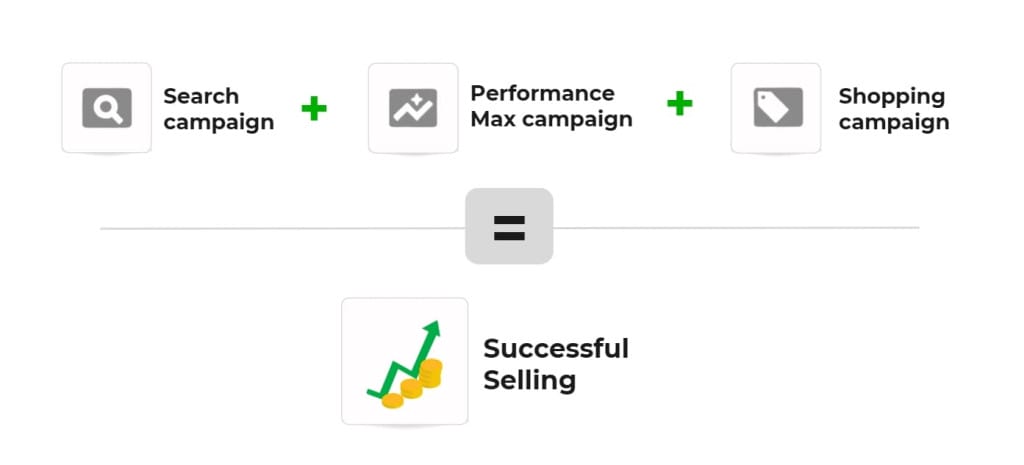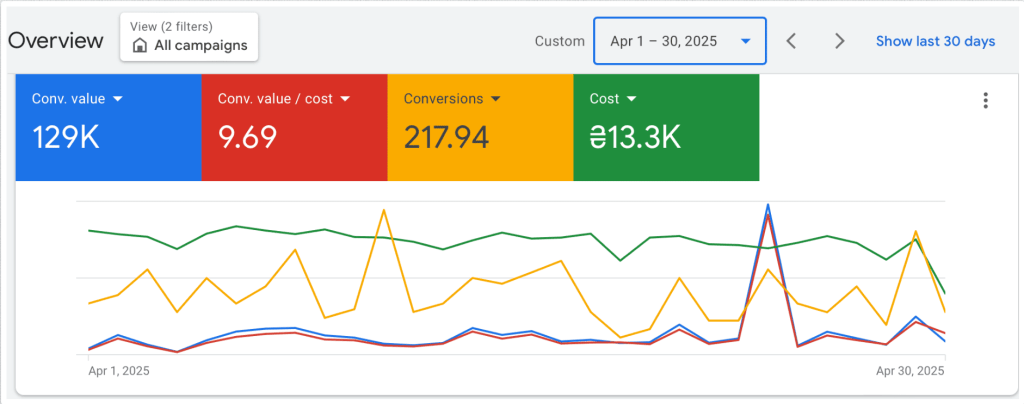
GOOGLE ADS CASE STUDY: HOW WE INCREASED ROAS FOR PUBLISHING BY 969%
A case study on how to achieve a ROAS of 969% or 160 sales per month in 7 months in a very specific field, like automotive literature.
Client
Our client is an official distributor of several publishing houses and sells professional automotive literature, including manuals, guides, and repair and maintenance instructions for various car brands.
Most of the customers are middle-aged men, including military personnel stationed on the front lines. This fact added a special sense of responsibility to the marketing strategy. In combat conditions, having access to quality manuals becomes a matter of life and, in some cases, national defense effectiveness. The military is receiving more new and used vehicles. In challenging conditions, cars often break down, and repairs must be done quickly and mostly by the soldiers themselves.
Goals:
- Increase sales
- Reach $2,407.50 in turnover
Tasks:
- Develop a strategy
- Set up and optimize advertising
- Increase traffic
Audit and strategy
We started working with the client in October 2024. The store migrated to a new platform, and the primary tasks were: first, to maintain the sales levels that were achieved on the previous platform, and second, to increase them. This task deserves a solid strategy.
For all clients, we start not only with advertising campaign strategies but also with analytics:
- Setting up events and conversions,
- Checking if Google Analytics 4 is correctly connected and configured,
- Checking the connection between Google Analytics 4 and Google Search Console,
- Connecting audiences,
- Importing conversions into Google Ads,
- Setting the required GEO data/resource name.
From the very start, we had to act differently than usual. Since a large part of the target audience is military personnel, we changed the geolocation settings for the ads—including temporarily occupied areas. It is clear that the demand for professional auto repair guides is particularly high in those areas compared to the rest of Ukraine. Therefore, all subsequent campaigns were set with this adjusted targeting.
Additionally, the client did not have a Merchant account set up, and the website was not ready for it. We fixed the errors that could have blocked future product feed-based ads.
Understanding that we won’t be able to rely on launching PMax and Shopping campaigns for a while, we started with a proven approach—setting up search campaigns. Thus, the first ones to appear in the client’s ad account were a branded campaign, a competitor-focused campaign, and a campaign targeting keywords related to “auto literature”. To boost their effectiveness, we also set up display remarketing targeting users who visited the website in the last 30 days.

Expert’s comment
The goal of the campaign was to achieve a monthly revenue of $2,407.50 with an advertising budget of $313.
Yes, the business is not new (it has been around for over 9 years), and this target was not set arbitrarily—it was the amount the client previously earned on Prom. Before, the client achieved such results on the Prom platform. After ending the partnership with Prom, a new website was created on the Horoshop platform, and the goal was to launch it with Google Ads. The main task was to launch a Shopping campaign and a PMax campaign to reach the set revenue target.
Concerns: Since the website does not directly sell BMW, Audi, and other cars but only repair manuals for them, there are concerns about launching Merchant due to the risk of being blocked for policy violations “Misleading”.
Therefore, the campaigns were initially launched without using the product feed. Meanwhile, several specialists checked the website for compliance with all Google requirements—adjustments were made, and the website was reviewed again. Only after that, the website verification in Merchant was initiated—it was successfully passed on the first attempt.
Furthermore, the work of our marketers delivered excellent results.
Anna Ovchinnikova, Account Manager at marketing.link
Preliminary results
This combination has already started driving traffic to the client’s website and increasing brand awareness. However, as expected, it has not led to a noticeable increase in sales. Obviously, without launching Merchant and setting up the feed, expecting more substantial results would be unrealistic.
Search campaigns in the e-commerce niche are always less effective compared to PMax or Shopping campaigns. Since the website adjustments were still ongoing and the client’s results remained our top priority, we decided to take another unconventional approach.
To accelerate spending and attract potential leads, we launched Ukrainian and Russian language DSA (Dynamic Search Ads) campaigns (the website is bilingual). As the name suggests, these campaigns automatically generate ad texts and select keywords for ad display based on the content and the most relevant landing page for the query, instead of using traditional targeting.
Another argument in favor of DSA campaigns is the search specifics of the professional automotive literature niche. There are many targeted keywords here that include the brand, model of a specific car, its modifications, and more.
To find them all, gather them, and then create an ad campaign with a separate final URL for each query would take too much time. That’s why the DSA campaign format was the perfect fit here. We cover the entire product range on the website, display highly relevant ads for each query, and save time. In less than a month, these campaigns immediately delivered strong results, showing an average of 80% impression share in the top position.
Yes, this increased traffic, but the truly impactful results came from Pmax and Shopping campaigns, just as our marketing strategy had predicted. As soon as the client completed all the website fixes, we promptly set up Merchant and the product feed. This allowed us to launch both Standard Shopping and Performance Max campaigns for the “Automotive Repair and Maintenance Manuals” category.
At the same time, optimization was carried out to improve advertising efficiency and reduce costs. Search for competitors and Ukrainian-language DSA were turned off due to unsatisfactory results, the budget of the remaining campaigns was distributed in favor of the newly created shopping and Pmax campaigns. The last missing pieces of the puzzle were in place.

In the first month after launching new campaigns, the client received 148 sales and an excellent ROAS indicator.

Over the following months, sales increased 3 times. The initial request of $2,407.50 of turnover was exceeded and now we are confidently moving towards the mark of $3611. Needless to say, this result became the main argument for the client to continue cooperation with us, which continues to this day.

Expert Comment
Years of experience working with e-commerce clients show that Performance Max campaigns are the most effective tool for generating online sales. However, to launch such campaigns, it is necessary to have an active account with functioning feeds in Google Merchant Center.
Therefore, for clients who do not have it yet, alongside setting up other campaign types, we conduct a comprehensive website audit to ensure compliance with all Google Merchant Center platform requirements and guidelines.
Google pays special attention to aspects such as online payment availability, shipping conditions, accurate pricing, image quality, and more.
Based on the audit, we provide specific recommendations on necessary website changes and assist with their implementation. This helps avoid account suspensions in the future and ensures stable ad performance.

Expert Commentary
The main challenge in launching Performance Max and shopping campaigns was creating a Merchant Center for the new website and successfully passing the review process. We meticulously and thoroughly reviewed the website for compliance with Google’s requirements, constantly making adjustments to ensure that the information on the site matched the information to be submitted to the Merchant Center. We also emphasized the importance of accurately entering payment details in Google Ads to the client. Completing all these steps ensured a successful and swift product review process, allowing us to quickly launch the Performance Max and shopping campaigns.
Do not attempt to deceive Google by posting misleading information on the website. Be honest, and this will ensure the continued stability of your advertising.
Anya Ponomaryova, PPC Specialist at marketing.link

Conclusion
Always thoroughly study your target audience in every detail. It’s not enough to understand what search queries they use—you need to understand their behavior and where they are, like in our case with soldiers on the front line. Neglecting Merchant setup in e-commerce is unacceptable. It’s a true must-have for this field, as it allows you to set up Pmax, shopping campaigns, and dynamic remarketing, among other things. This boosts the effectiveness and competitiveness of your ads. Search campaigns cannot serve as a complete alternative to them.